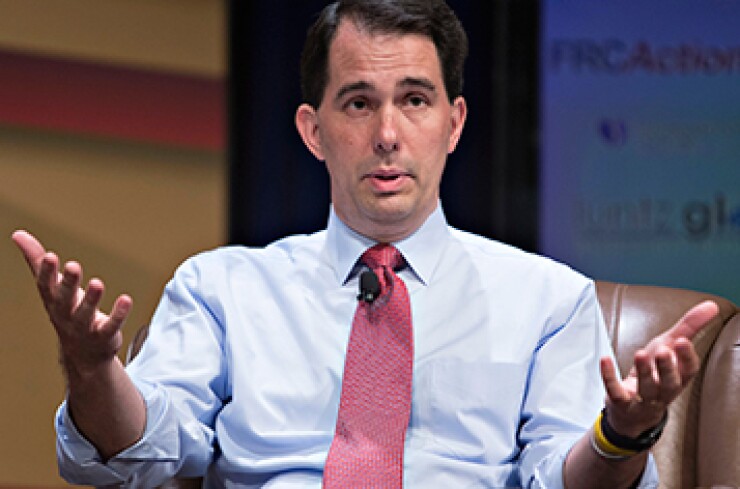
CHICAGO – Wisconsin Gov. Scott Walker laid out a two-year, $76 billion
The budget would provide an additional $649 million in kindergarten through 12th grade funding – an area hard hit by Walker's cuts earlier in the decade as the state grappled with a multibillion-dollar deficit. The University of Wisconsin system, which previously saw state aid cuts, would receive an additional $100 million and tuition would be frozen for two years.
The budget includes nearly $600 million in what Walker calls tax relief. It would cut income taxes by $203 million by lowering the tax on lower brackets; sales taxes by $22 million through a back to school sales tax holiday; and property taxes by $340 million by eliminating the state's portion and providing additional aid to districts and local governments that would be directed to property tax relief. It also restores a $20 million low-income tax credit.
Walker's plan would raise state worker pay by 2% in each of the budget years that begin July 1, 2017 and July 1, 2018.
"We're putting more money into public education than ever before, making college even more affordable, caring for the truly needy, building a stronger infrastructure, rewarding work, and cutting taxes to the lowest point in decades," Walker said in his budget address late Wednesday.
The two-year plan would authorize a little more than $1 billion of borrowing including general obligation debt of $334.8 million, $165.2 million of revenue-backed bonding, and $500 million of transportation related borrowing.
The total figure represents $662 million on new authority and the reauthorization of $365 million of debt, said capital finance director David Erdman. The total marks the lowest level of authorized borrowing in two decades.
The budget calls for a direct transfer of $20 million to the state's modest reserves. While the amount is low, it is a "direct transfer and not contingent on actual tax collections," Erdman said. Deposits into the account otherwise depend on the size of fund balances.
The budget would provide about $6.1 billion in transportation funding which critics say falls far short of what's needed and relies too heavily on borrowing. In addition to the $500 million in borrowing, the funding package relies on an annual transfer of excess revenue from a petroleum inspection fee.
The budget would cancel funding for the Interstate 94 east-west project, diverting the funding for work on a separate project on Interstate 94. Some projects in the works that haven't already begun would be delayed.
Both the level of spending and transportation funding has raised concerns among some Republican lawmakers who renewed their calls for a gasoline tax and higher registration fees to address the state's transportation funding needs.
Walker had previously said he would only support transport tax increases if accompanied by other tax reductions but had in recent months backed away from that position and in his budget address made clear he's against any gas tax hike.
"This is a good budget proposal but a work in progress," said Assembly Speaker Robin Vos, R-Rochester. "It's disappointing Gov. Walker has forgotten that a long-term solution for transportation is a priority, too."
Some critics said Walker's spending plan could leave the state with a hole to plug in the following biennium -- after the 2018 election. The Republican governor, who enjoys Republican majorities in the legislature, has announced his intention to seek re-election in November 2018.
"This proposal gives us a solid starting point as we begin the state budget process," state Sen. Alberta Darling, R-River Hills, and state Rep. John Nygren, R-Marinette, the co-chairs of the powerful budget writing Joint Finance Committee, said in statement. "Moving forward, we will consider all of the necessary programs that rely on state dollars and ensure that these programs are funded appropriately."
Democrats had little positive to say despite the increased education funding.
"The proposals the governor is floating in the budget is an acknowledgment of his failure over the past six years to prioritize the programs most important to the people of Wisconsin," Rep. Gordon Hintz, D-Oshkosh, said in a joint statement issued by the Democratic members of the Joint Finance Committee.
"After Governor Walker's disastrous budgets, he is finally backtracking on some of his deep education cuts to preserve his poll numbers," said Rep. Katrina Shankland, D-Stevens Point.
The non-partisan Legislative Fiscal Bureau reported last month that the state expects $454 million more in general fund taxes will be collected through the next two-year budget cycle than previously projected. The figures are up from what the administration had projected in a November report.
The state carries AA or equivalent general obligation ratings.





